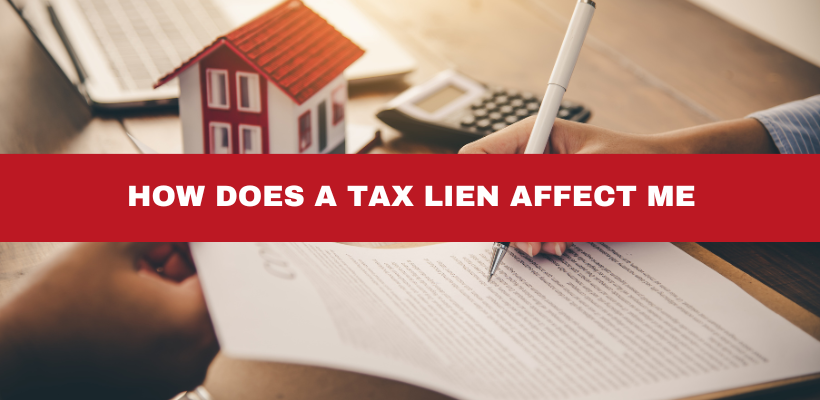If you have been wondering what happens when the IRS puts a tax lien on your property, here’s one key fact: it does not show up on your credit report. While tax liens might not show up on the main consumer credit reports as often as they used to, they can still carry serious consequences.
A tax lien may arise when you owe back taxes to the IRS (or a state tax agency), and the government places a legal claim on your property to secure the debt. This notice is generally filed with the relevant county or state agency, making it part of the public record. Even though it may not always appear on your credit report, lenders and other interested parties can discover a tax lien through background checks and data aggregators.
Below, we’ll examine how a tax lien can affect your financial life and what steps you might take to address it.
1. A lien may still appear in certain checks.
While the three major credit bureaus (Equifax, Experian, and TransUnion) stopped widely reporting tax liens a few years ago due to stricter public record requirements, the information doesn’t just vanish.
- Background checks. Employers, landlords, and lenders may run more in-depth checks that pull data from public records, exposing the lien.
- Third-Party databases. Specialized credit agencies or data aggregators could still include information about your lien.
Consequently, even though you might not see the lien under standard credit report entries, it remains discoverable and can influence decisions by future lenders, landlords, or other parties.
2. You may face challenges when it comes to real estate transactions.
One of the most direct consequences of a tax lien is the impact on any property you own. If the IRS has filed a Notice of Federal Tax Lien, it means the government has a legal claim on your assets, including your home or other real estate.
- Refinancing your mortgage. If you want to refinance your mortgage, the lender may require you to resolve or substantially address the tax lien first. This could mean setting up a payment plan or paying a portion of the debt at closing.
- Selling your property. You generally cannot sell or transfer ownership without satisfying the lien; any sale proceeds are typically subject to the government’s claim until the outstanding tax debt is paid.
This can significantly limit your ability to tap into equity or relocate, making it crucial to address the lien as soon as possible if you’re planning any real estate transactions.
3. A lien may have an impact on your business credit.
If you’re a small business owner, a federal tax lien can cast a long shadow over your professional finances. The lien can apply not just to personal property but also to business assets, depending on how your finances are intertwined.
- Difficulty securing loans. Banks and other commercial lenders may be hesitant to extend credit if you have an active lien, fearing you won’t have the cash flow to repay them on top of your tax debts.
- Potential reputation concerns. Suppliers and clients who learn about the lien might question your business’s financial stability, which can harm your professional relationships and limit opportunities for growth.
Simply put, a tax lien can undermine both your personal and professional credibility, making it more challenging to secure the capital you need to maintain or expand your operations.
4. A tax lien can take an emotional and financial toll on you.
Beyond the tangible effects on credit and property, there’s a personal toll when dealing with a tax lien. Knowing that the government has a legal claim on your assets can create a constant sense of worry. If left unaddressed, the situation can escalate.
- Levy or seizure. If you don’t take steps to resolve the lien, it can progress to a levy, allowing the IRS to seize bank accounts or other property to satisfy the debt.
- Ongoing financial strain. Every attempt at borrowing or applying for credit can feel like an uphill battle. Additionally, the fear of asset seizure can be an ongoing source of stress for you and your family.
This personal strain underscores the importance of proactively addressing a tax lien rather than ignoring it.
Final Thoughts
Even though tax liens don’t always appear on standard credit reports anymore, they’re far from harmless. Public records remain accessible, and a Notice of Federal Tax Lien can hinder real estate transactions, limit your business’s ability to borrow, and create significant personal stress. If you’re facing a tax lien, the most important step is to act quickly and explore your resolution options, whether through a full payment, installment agreement, or another form of relief.
Taking the time to address the lien and work with professionals if necessary, you can be in a better position to protect your assets, maintain financial stability, and move forward with greater peace of mind.







 Steven N. Klitzner, P.A. is a tax attorney based in Miami, Florida. He has been practicing tax law for over 40 years, and currently holds a 10.0 rating by Avvo. Mr. Klitzner was appointed to the IRS Service Advisory Council in 2021 and is...
Steven N. Klitzner, P.A. is a tax attorney based in Miami, Florida. He has been practicing tax law for over 40 years, and currently holds a 10.0 rating by Avvo. Mr. Klitzner was appointed to the IRS Service Advisory Council in 2021 and is... 





